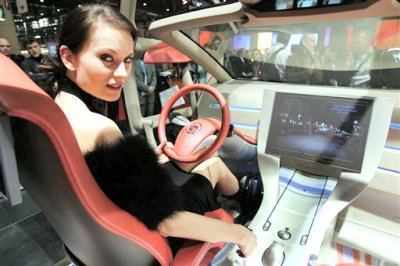
"The trend is going toward versatility and a lot of variety," said Yves Dubreil, vice president-deputy director of vehicle engineering at Renault. "It used to be that car brands had a straightforward range that went from small to big. It reflected social status. The bigger the car I had, the more important or rich I was.
"Cars are no longer an indication of a driver's social status, instead, they make a statement about a person's lifestyle. And there are a lot of different lifestyles."
For the sociable soul, there's the cavernous and friendly Renault Grand Espace.
For the more dynamic, there's the sporty Ferrari F430 Spyder or the Mazda MX-5, both making their world premieres in Geneva.
The adventurous can take control of the 4x4 new Jeep Grand Cherokee, an off-roader actually produced in Austria, or the top-of-the-range Mercedes M-Class SUV.
The business tycoon can slip into the sleek, newly redesigned BMW 3-Series or the Mercedes CLK, which also underwent a stunning facelift.
"You spend a lot of time in your car; you want it suited to you," said Fabio Capano, director of product communication for Toyota Motor Marketing Europe. "You also want it tailored to all of your modern-day needs."
This means today's vehicles must meet mobile phone, music, entertainment, navigational and informational demands.
"Bluetooth, a hands-free option for your phone, having your mobile phone reception switch over to reception from your car antenna, a place to recharge your mobile phone, a navigational screen where you can also look at all your phone numbers and your address book: you want a car that features or adapts to the latest electronic possibilities," Debreil said. "It's one of our major concerns today."
Cars are now being built so well that they can last at least 10-12 years, but electronic technology evolves much faster than that, and allowing for swapping out components requires a great deal of forethought, he added.
Electronics
Some car makes, such as Toyota, Renault and Lexus, already offer bluetooth options, but other companies are less willing to make costly additions today for tomorrow's unknown.
"We want to keep Chevrolet as affordable as possible, an entry-level car," said Eric Neve, manager of Motorsports Europe for Chevrolet. "We won't install capabilities for a technical accessory if there's only a slight possibility it's coming up in future years."
But the relationship between carmakers and the electronics business is getting tighter.
Accepting the widely respected Deutsche Industrie Normen, car makers from around the world use universal dimensions for electronic accessories so consumers can change radios, CD players and navigational aids unhampered. This also applies to hidden electronic devices, such as air bags.
That, however, gives electronics suppliers a certain amount of power over the automotive industry.
"It's an interesting debate because the car industry relies heavily on electronics suppliers," Neve said. "You don't want them dictating what's available or else all the cars would be the same.
"There are only a few big suppliers - Delphi, Bosch, Siemens - but you still want your car to be a Chevrolet and not something simply off the shelf. We have some power to demand certain things, of course. When a supplier talks to Chevrolet, it's a potential 1.3 million cars a year. It's the power of volume."
The Swiss show is unique among the world's major car fairs, held in a country with no major auto industry of its own. Automakers regard it as an even playing field to show off their products.
Geneva's show is hosting 261 exhibitors from more than 30 countries, displaying over 900 makes and more than 70 world or European premieres in the passenger car sector alone.
The annual exhibition anticipates 700 000 visitors - 300 000 of them from foreign countries.




 Publications
Publications
 Partners
Partners










